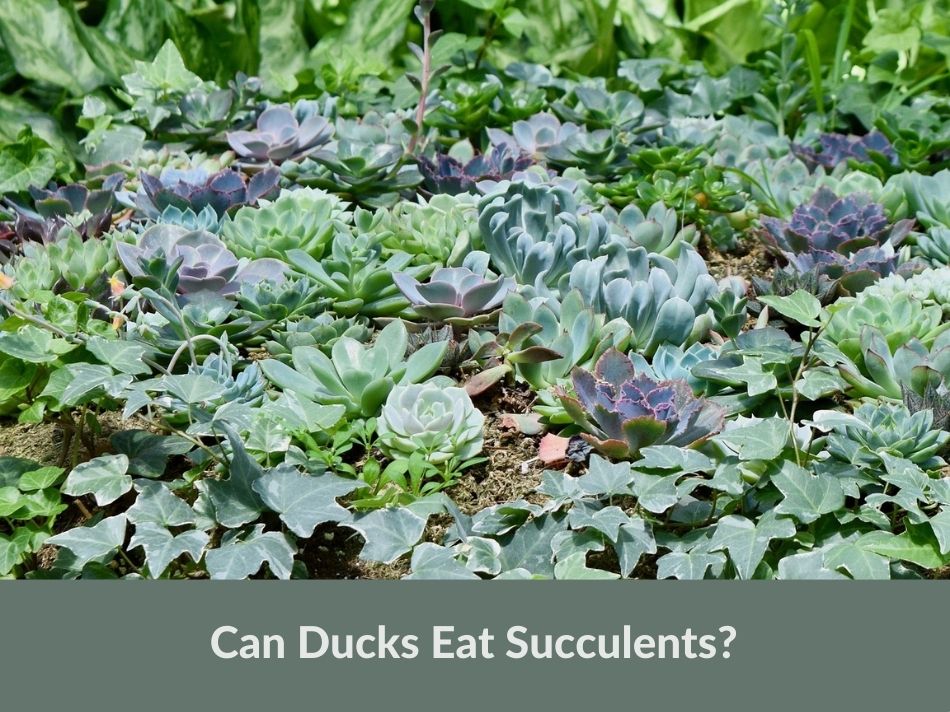Ducks, with their voracious appetites and curious natures, are known for feasting on a wide variety of foods, from water plants and small insects to grains and aquatic creatures. But, can ducks eat succulents?
While some succulents are generally considered safe for ducks, many varieties are not. It’s best for ducks to stay clear from succulents to minimize the risk of poisoning.
In this article, readers will explore the intriguing intersection of ducks and succulents. Delving into the nature of succulents, their characteristics, and their potential effects on ducks, the article sheds light on the nutritional and safety considerations for ducks consuming these water-storing plants
What Are Succulents?
Succulents are plants distinctively known for their water-storing capacities, allowing them to flourish in arid conditions. Their most notable features include thick, fleshy leaves or stems and an evolved form of photosynthesis, called CAM (Crassulacean Acid Metabolism), that minimizes water loss.
This unique method lets them intake carbon dioxide during the cooler nights rather than the day, an adaptation to environments with limited water. There’s a diverse range of succulents, from the medicinal Aloe vera with its gel-filled leaves to the rosette-shaped Echeveria.
Cacti, another well-known group, stand out with their spiny exteriors and varying shapes. These plants often possess a waxy or hairy surface to trap moisture, and their root systems are generally shallow, optimizing quick water absorption from infrequent rainfalls.
In essence, succulents are a remarkable group of plants specifically adapted to thrive in challenging, water-scarce environments. Their unique adaptations not only facilitate their survival but also make them a favorite among gardeners and houseplant enthusiasts worldwide.
Succulents Nutritional Value
Succulents aren’t necessarily a natural food source for ducks. While they might have some water content due to their juicy leaves, they don’t offer much in terms of nutritional value for a duck’s diet.
Ducks require a well-rounded diet that includes grains, greens, and proteins typically derived from insects and small aquatic animals.
Are Succulents Toxic To Ducks?
Not all succulents are safe for consumption. Some, like certain varieties of Euphorbia or Kalanchoe, contain compounds that can be toxic when ingested. For instance, Euphorbias produce a milky sap that can be irritating to the skin and mucous membranes.
If a duck were to eat such plants, it could lead to gastrointestinal distress or other health problems.
Symptoms of Succulent Poisoning
If you suspect that your duck has ingested a significant amount of succulents, especially a potentially harmful variety, monitor for signs of distress. These can include drooling, lack of appetite, lethargy, or any unusual behavior.
If you observe any of these symptoms, consult a veterinarian immediately.
Other Berries Ducks Can Eat
Ducks can also diversify their diet with an array of plants & flowers that may naturally fall into their path or are introduced as treats. While some flowers can be both nutritious and delightful for ducks, always ensure they’re non-toxic and safe.
Make sure to see our thorough list of plants and flowers ducks can enjoy.
Conclusion
While succulents are a delight for human gardeners and houseplant enthusiasts, they’re not ideal food sources for ducks. Due to potential toxicity concerns and lack of nutritional value, it’s best to keep ducks and succulents separate.
If you are raising ducks and have a garden, ensure that any potentially harmful plants are out of their reach or fenced off. Always prioritize the health and safety of your feathered friends.
Disclaimer: The information in this article is for informational purposes only. I'm not an expert or a veterinarian.


